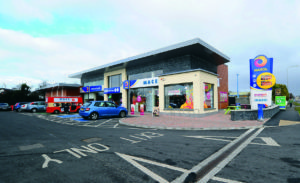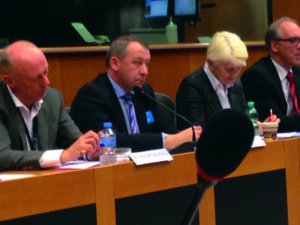Fee advice

Although trade has been picking up for independent retailers in recent weeks, many challenges still remain with rural towns and villages continuing to struggle in an extremely competitive sector. With that in mind, Gillian Hamill caught up with RGDATA president Colin Fee to hear how the retailers' organisation is attempting to combat the obstacles facing its members
29 July 2016

Maxol Mace on the Dublin Road in Dundalk stars in Maxol’s latest TV advert
With RGDATA representing more than 4,000 members, serving as the association’s president is both an honour and a serious time commitment that’s not for the faint-hearted. Already this year, the current sitting president, Colin Fee, has travelled to Brussels to represent the organisation before the European Parliament, no less. Fee also recently led a RGDATA delegation to meet members of the Low Pay Commission in Monaghan, where he highlighted the particular difficulties faced by retail employers in the border area. All while carrying out the ‘day job’ – and negotiating the various hurdles faced by independent retailers on a daily basis. Together with his brother Eugene, Colin Fee operates two Maxol Mace forecourts and two standalone Mace stores in Dundalk.
Although he concedes that if he didn’t already have a full-time job in retailing, he would have more time to concentrate on the presidency, Fee is confident that his first-hand retail experience gives him the opportunity to “talk with conviction” about the issues facing independent retailers.
Structural separation
A key issue at the moment is the government’s proposed introduction of structural separation for alcohol products in grocery stores. Fee believes that instead of tackling the problem of below-cost selling and the use of alcohol as a loss-leader in supermarkets, the move would unfairly penalise smaller stores, who are already community-focused, responsible retailers of alcohol. Whereas a large supermarket could more easily justify the cost of installing checkouts within a separate off-licence section, this is not the case for smaller stores, Fee says. “It’s very difficult for small shops and it creates an onerous overhead because it increases the staffing levels,” he notes.
“If you look at the majority of independent retailers, they’re community-based shops; they know who’s coming in, they know the kids,” Fee adds. “They know if a 19-year-old is coming in buying drink and there are youngsters outside, waiting for them to come out, we refuse point blank to serve them. And if somebody’s coming in buying drink and they’re worse for wear, we do refuse them and you don’t get that in supermarkets. The local shops are in many cases more responsible in the selling of alcohol than some of the bigger shops. I’m not saying that the [larger stores] are careless or not obeying the rules, but smaller shops have more interaction and a better knowledge of who’s who in the community.”
Fee adds that his own staff are particularly vigilant around exam and graduation seasons and that on one occasion, they actually closed their off-license section when the guards had a concern about potential underage drinking after a football match. “That’s community retailing and that’s what it’s all about,” he says. “This idea that one brush covers everything, it’s not right,” he adds. “I think it’s a step backwards; I don’t think it’s going to further the cause of responsible alcohol retailing, I really don’t. It’s just going to put extra cost and hassle on an already pressurised bunch of people.” Subsequently, RGDATA has urged new Health Minister Simon Harris not to introduce the Sale of Alcohol Bill 2015 back into the Oireachtas in its current format, and is asking retailers to make their feelings clear on the matter to their local TDs.
Margins on payment services
Another major issue RGDATA wants rectified is the “non-existent” margins for retailers on payment services. “We’ve met with them [payment service providers] in the past and we’ve been trying to get into government to try and get something done, because the margins are loss-making,” Fee says. “When you add in the amount of time that is involved with a lot of payment services, such as toll charges, the gross profit we’re getting is absolutely miniscule. I would be a very strong advocate of introducing a minimum margin that we have to get, because in a lot of cases, it’s not just about selling a product, it’s very labour intensive. If there are issues, for example, if somebody keys in the wrong car registration for a toll, there’s quite a process to get that reversed and it’s just not worth it, for the money that you’re turning over.” When bank charges are added into the equation – which Fee says can range from 23c – 44c per €100 – the problem is simply exacerbated.
On the topic of margins, he points to RGDATA’s success in ring-fencing the retailer’s 6% margin on the Lottery at the time of its sale to Premier Lotteries Ireland, as an example of how “a reasonable” margin can be achieved. “RGDATA were instrumental when the sale was going through to make sure that we maintained our 6% margin,” Fee says. “But if you look at some of other offerings, we’re down at less than 1% in some cases.”
Whereas once, Fee felt that the ‘footfall driver’ argument behind such services rang true, he feels this is not the case anymore. “It’s a footfall driver if you’re the only one in the town with the machine but now that everybody has them, they’ve got the inverse effect. You have to have the machine now, because if you don’t, it’s the opposite of a footfall driver whereby you lose footfall if you take the machine out.”
Revitalising town centres
Speaking of footfall drivers, rural towns and villages will not attract sufficient footfall, according to Fee, without sustainable retail development by planners. This includes a need for proper town centre health checks and the development of town plans based on sound statistics and measurements. “The whole planning issue has to be looked at,” says Fee. “We really need to incentivise people to get businesses back into the town centres and make them more vibrant.
“We have a huge housing crisis at the moment and yet if you go into any Irish town, up over the shops, there’s two or three storeys of perfectly good living accommodation,” Fee adds. “There should be some incentive made for property owners and landlords to be able to develop that.
“I feel if we got more people back in the towns, then businesses would generate and our towns would become more vibrant and then you’d find cafes and bars opening,” he continues. “If you look at a lot of European towns and cities, that’s what happens. You walk down a street and every second door is a polished door knob and letter box, plant pots, the windows are decorated and it looks really nice; you don’t see that in Ireland. There’s one or two exceptions, I think Westport is particularly good. However in the main, the life has gone out of our towns and that is just through planning; I won’t say bad planning, but a lack of joined up thinking.”
Planning permission
Looking specifically at Dundalk, it has a town centre manager under the BIDs scheme, whereby a percentage of the rates goes towards paying his wages and Fee thinks this has proved effective. However, he believes that Dundalk also displays an example of poor planning. The Carroll Village shopping centre is now completely closed, despite only being built in the last 15 years. “Dundalk has 44,000 people and we just have too much [retail space]. Drogheda is probably the same,” he says. Newer retail centres, Scotch Hall in Drogheda and The Marshes in Dundalk “are both beautiful shopping centres,” Fee adds, “but you have to question why were we given planning permission for shopping centres when the existing ones were not fully let at the time? There has to be some sort of a phased approach to it [where the planners] do a litmus test of what’s available before planning for more retail space is granted.”
So what does Fee reckon is the solution to revitalising our towns and villages? “We need to try and think outside the box to make it more practical to get people back in,” he says, with incentives such as tax breaks or reductions in rates for new businesses. “To be fair to Louth County Council, they’re very supportive,” he adds. “It’s a tough call because we have too much retail space, we have over-capacity. We need a national strategy and we need all stakeholders to join up and agree [on measures] and then over a period of time, try and pull the life back into towns.”
Living wage

Colin Fee (second from right) with the delegation that attended the Low Pay Commission meeting in Monaghan
As mentioned earlier, Fee also recently met with the Low Pay Commission in Monaghan, where he highlighted how border retailers are particularly vulnerable to fluctuations in the sterling-euro exchange rate, and the difficulties of competing against northern retailers with lower wage bills. ShelfLife was also keen to hear Fee’s thoughts on the ‘living wage’ rate of approximately €11.50 per hour, as calculated by the Living Wage Technical Group. “The cost of living in Ireland is rising and the grocery sector is a very competitive market and wage costs are the biggest overhead we have,” he says. While he notes that “the majority of people in our business would be paid well above the minimum wage [€9.15 per hour],” he says that higher wage rates force many independent retailers to cut staff hours, as they have to stick to a set budget. The result is a drop in service levels, with staff not feeling the “net benefit” of wage increases. “A lot of our members are competing head-on with the discounters and their model is totally different,” he says. “The service you get is not like the service you get with us – they’re very selective with what they sell – a lot of the labour intensive products, they don’t do, so it’s hard for us to compete against them; plus their hours of opening are a lot less than ours are.”
The other problem with this, as Fee points out, is, “as we get closer and closer to what they call the living wage, it gets harder and harder to differentiate [between] staff. “It’s very hard to have people on higher wages, because everybody’s on a much higher level. I personally think it should be staggered as people get older, that the increments get bigger, as people get more mature. I think that is definitely something that should be looked at.”
Economic contribution of independents

Colin Fee (second from left) at the EU Parliament meeting in Brussels
Another important event that Fee attended this year took place in April at the European Parliament in Brussels. Hosted by MEP Anne Gericke and Independent Retail Europe, the session was titled, ‘The social impact of independent retailers in the local community’. In his presentation on behalf of RGDATA, Fee highlighted the impact for small retailers of EU regulation and red tape. He also outlined the findings of ‘Local Heroes II’ – research commissioned by RGDATA and compiled by economist Jim Power, which demonstrates the significant social and economic contribution of Irish family-owned shops. This includes the fact that Irish local independent shops invest €3.62bn annually in the national economy and support 90,000 jobs. Local independent food shops are also at the heart of vibrant communities in Ireland – contributing over €100m annually in local government charges and investing €41m in local sponsorship.
What these numbers show, says Fee, is the “phenomenal” impact of retailers, whereby “even though we are all independent, we are big employers.” Combined, Ireland’s independent retailers are a voice worth listening to and a force to be reckoned with – on both a European and national stage.



 Print
Print




Fans 0
Followers